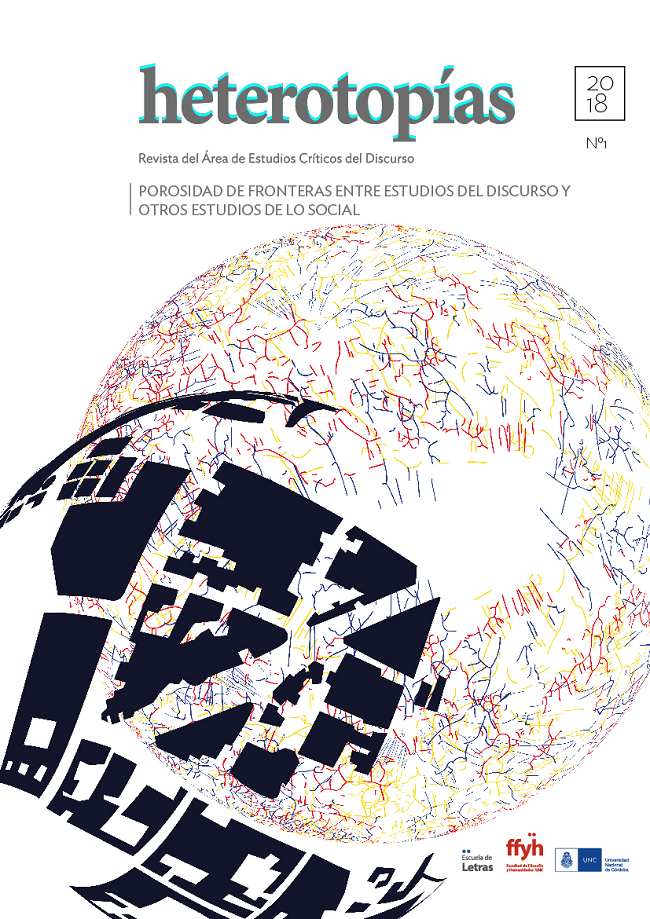Integración y creación de categorías teóricas en los procesos de investigación (o de las posibilidades de diálogo entre arte y ciencia)
Main Article Content
Abstract
Though this work is orientated by theoretical-methodological worries, which concern the forms in which they are generate and/or take in "lending" categories or conceptual figures, from different disciplines or areas, to integrate them in a process of investigation or a theory, this text takes as a motivation Antonio Berni's pictorial work, so known from the history and critique of art in Argentina. The second purpose of this article, is to think about the possibilities and limits of dialog between art and science; We have to say also, we are interested what art could teach with regard questions of epistemological order. We are stimulated by the conviction that the work of art, in its different modalities and kinds, can demonstrate logics of conceptual/sensory integration similar to the brought into the social investigation and its consideration might help to their development, being this text just an attempt in this direction.
Downloads
Article Details
Those authors who have publications with this journal, accept the following terms: Those authors who have publications with this journal, accept the following terms:
a. The authors will keep their copyright and guarantee to the journal the right of first publication of their work, which will be simultaneously subject to the Creative Commons Attribution - Non-Commercial - Share Alike (by-nc-sa) Attribution License; no commercial use of the original work or any derivative works is allowed, the distribution of which must be done with a license equal to the one that regulates the original work.
b. Authors may adopt other non-exclusive license agreements for the distribution of the published version of the work (e.g., deposit it in an institutional telematic archive or publish it in a monographic volume) provided that the initial publication in this journal is indicated.
c. Authors are allowed and recommended to disseminate their work through the Internet (e.g. in institutional telematic archives or on their website) before and during the submission process, which may lead to interesting exchanges and increase the number of citations of the published work. (See The effect of open access).
How to Cite
References
BARROS, Mercedes. (2008). “Articulación de lógicas y conceptos: el análisis político desde la teoría del discurso post-estructuralista”. Pensamento Plural, 3, julho/dezembro. 167-178.
BAUMANT, Zygmunt. (2005). Modernidad líquida. Buenos Aires: Fondo de Cultura Económica.
BERNI, Antonio (s/f). Área de Educación y Acción Cultural / Propuestas para Educadores, Museo De Arte Latinoamericano de Buenos Aires. Disponible en: http://www.malba.org.ar/web/descargas/Berni.pdf.
BERNI, Antonio (s/f). Colección Educ.ar CD 5, Ministerio de Educación, Ciencia y Tecnología, contenidos producidos por La Isla de los Inventos, Secretaría de Cultura y Educación de la Municipalidad de Rosario. Disponible en: http://coleccion.educ.ar/coleccion/CD5/contenidos/acercade/index.html.
BUENFIL BURGOS, Rosa Nidia (coord.). (2002). Configuraciones discursivas en el campo educativo Cuaderno de de-construcción conceptual, 4. México: Papdi & Plaza y Valdes.
BUENFIL BURGOS, Rosa Nidia (2008). La categoría intermedia. En Ofelia Cruz y Laura Echavarría (Coords.), Investigación social. Herramientas teóricas y análisis político de discurso. México: Juan Pablos y Papdi.
CABRERA, Daniel. (2011). “Imaginarios y ensoñaciones tecnológicas. Las nuevas tecnologías como clave sociocultural” (conferencia), 13 de octubre de 2011, organizado por la Facultad de Filosofía y Humanidades y el PROED de la Universidad Nacional de Córdoba. Recuperado de: http://vimeo.com/31148978.
DE CERTEAU, Michel. (1994). “Las universidades ante la cultura de masas”. En La cultura en plural. Buenos Aires: Ed. Nueva Visión.
DELEUZE, Gilles y GUATTARI, Felix. (1998). Capitalismo y Esquizofrenia Vol I. El Anti-Edipo. Buenos Aires: Paidós.
DELEUZE, Gilles y GUATTARI, Felix. (2002). Capitalismo y Esquizofrenia Vol II. Mil Mesetas. Buenos Aires: Ed. Pre-textos.
DERRIDA, Jacques. (1989). La escritura y la diferencia. Barcelona: Anthropos.
GARCÍA SALORD, Susana. (2007). “Prólogo. Horizontes de intelección: las nuevas miradas de una mirada diferente”. En Fuentes Amaya, Silvia (Coord.), Horizontes de intelección en la investigación educativa: discursos, identidades y sujetos. Serie Cuadernos de De-Construcción Conceptual en Educación, 7, pp. 17 a 35. México: Casa Juan Pablos & SADE.
GINZBURG, Carlo. (1981). El queso y los gusanos. El cosmos según un molinero del siglo XVI. Madrid: Muchnick Editores.
GLYNOS, Jason y HOWARTH, David. (2007). Logics of critical explanation in social and political theory. London: Routledge.
GUATTARI, Felix. (2001). Caosmosis. Buenos Aires: Manantial.
LACLAU, Ernesto y MOUFFE, Chantal. (1987). Hegemonía y estrategia socialista. Hacia una radicalización de la democracia. Madrid: Ed. Siglo XXI.
NAVARRETE, Zaira. (2009). “Eclecticismo teórico en las Ciencias Sociales. El caso del análisis político de discurso”. En Soriano, Reyna y Avalos, M. Dolores (Coords.), Dispositivos intelectuales en la investigación social. México: Juan Pablos y PAPDI.
REMEDI, Eduardo. (2007). “Entrevista”. México: DIE-Cinvestav.
SAUR, Daniel. (2006). Reflexiones metodológicas: tres dimensiones recomendables para la investigación sobre discursos sociales. En Jiménez, M. Antonio (Coord.), Los usos de la teoría en la investigación. México: Ed. Plaza y Valdés.
VÁSQUEZ ROCCA, Adolfo. (2010). “Zigmunt Bauman: modernidad líquida y fragilidad humana”. En Revista Observaciones filosóficas, 10. Recuperada de: http://www.observacionesfilosoficas.net/zygmuntbauman.html.
VERÓN, Eliseo. (1987). La semiosis social. Fragmentos de una teoría de la discursividad. Buenos Aires: Ed. Gedisa.
VERÓN, Eliseo. (2013). La semiosis social, 2. Ideas, Momentos, Interpretantes. Buenos Aires: Paidós.
VIEITES, Glenda. (2006). “Entrevista a Zygmunt Bauman”. En El interpretador, 22, enero. Recuperada de: http://www.elinterpretador.net/22EntrevistaZygmuntBauman.html.
WITTGENSTEIN, Ludwig. (1988). Investigaciones filosóficas. México: Alianza IIF-UNAM.
